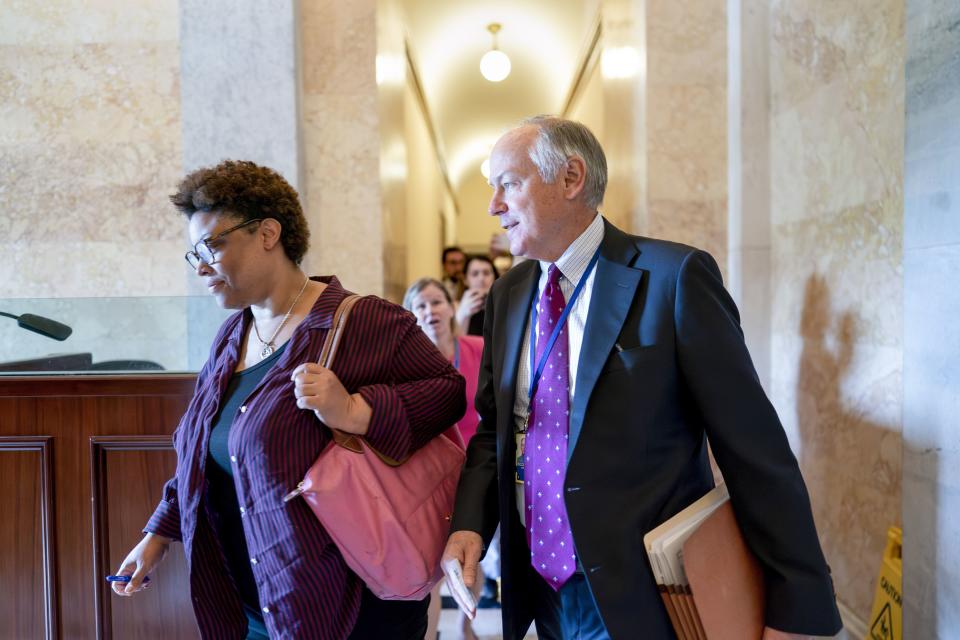After brief pause, debt ceiling talks between Biden and GOP back on

- Oops!Something went wrong.Please try again later.
- Oops!Something went wrong.Please try again later.
Debt ceiling talks were back on Friday after Republicans paused negotiations earlier in the day over disagreements with the White House on how much money should be cut in exchange for an increase in the amount of money the nation can borrow.
House Financial Services Chairman Patrick McHenry, R-N.C., said talks had resumed and negotiators planned to work over the weekend, according to Politico. The White House and congressional leaders are trying to come to an agreement to stave off a default, which Biden administration officials warn could come by June 1.
Speaker Kevin McCarthy said Friday on Fox Business that Republicans would work into the night Friday but they expected Democrats to make additional cuts.
“It’s very frustrating if they want to come into the room and think we’re going to spend more money next year than we did this year. That’s not right, and that’s not going to happen,” he said.
Earlier in the day, Rep. Garret Graves, R-La., who was asked by McCarthy to represent the GOP in negotiations, said the negotiations had stopped.
“We’ve decided to press pause, because it’s just not productive,” Graves told reporters Friday, according to Politico.
“The House passed a strong bill, it has great savings in it. And it’s responsible and it puts us on a path to bend the curve,” he said, per Fox News.
Republicans have criticized President Joe Biden over waiting to start negotiations, even after the House GOP passed a bill that combined a debt ceiling increase with spending cuts.
The Republican debt ceiling bill, the “Limit, Save, Grow Act,” passed the House in April largely along party lines. It would cut spending by $4.8 trillion over the next 10 years, according to the Congressional Budget Office.
Biden and congressional leaders expressed optimism earlier this week, saying they believed a deal was possible.
“Everyone, including the speaker, agreed we need to be bipartisan,” Senate Majority Leader Chuck Schumer said Tuesday after meeting at the White House with Biden and the other House and Senate leaders.
But before he initiated negotiations, Biden was pushing back on the spending cuts included in the GOP’s bill, calling them “devastating” in a campaign-style speech earlier this month.
Washington has to spend less.
It's as simple as that.— Kevin McCarthy (@SpeakerMcCarthy) May 19, 2023
Related
Utah Gov. Cox: Find Common Ground
At a press conference Thursday, Utah Gov. Spencer Cox said he hoped Congress and the Biden administration would come to a compromise.
“It seems like the lowest of bars for a very dysfunctional federal government just ... rational human beings sitting down and coming to an agreement. It’s compromise, right?” he said.
Cox, who is currently co-chair of the National Governors Association, said he and his fellow co-chair, Democratic New Jersey Gov. Phil Murphy, had come together to release a statement in February calling on Congress and Biden to “work together to ensure a bipartisan solution” on the debt ceiling.
“We call on Congress to increase or suspend the debt limit as soon as possible. And we call on both the administration and Congress to consider serious long-term reforms that will reduce the national debt and put the country on more sustainable fiscal footing. States and territories succeed when there is certainty and stability in federal resources,” they said.
Cox reiterated on Thursday the need for both Republicans and Biden to make concessions during talks.
“The President absolutely has to give on cutting back on some federal expenditures. He just has to. This idea of a clean debt ceiling increase, it’s not going to happen,” he said. “And again, on the House side, on the conservative side of things, we have to be willing to find some common ground and meet the president somewhere in the middle.”
Pressure from the political right and left
On Friday, a White House official told Politico, “There are real differences between the parties on budget issues and talks will be difficult. The president’s team is working hard towards a reasonable bipartisan solution that can pass the House and the Senate.”
As McCarthy receives pressure from the House Freedom Caucus not to give up too much in negotiations, Biden is getting pressured by progressive members of his party not to give in to Republican demands.
Rep. Pramila Jayapal, D-Wash., chairwoman of the Congressional Progressive Caucus, told Axios there would be a progressive “backlash” if the White House made concessions on welfare working requirements and energy permitting reform.
Her comments were echoed by Rep. Alexandria Ocasio-Cortez, D-N.Y., who said the White House should “expect pushback on nearly any significant concession.”
Meanwhile, GOP congressional leaders released messages about spending cuts on social media Friday afternoon.

“Washington has to spend less, it’s as simple as that,” McCarthy said in a tweet.
Republican Senate Minority Leader Mitch McConnell said in a tweet that the president “waited months before agreeing to negotiate” with McCarthy.
“They are the only two who can reach an agreement. It is past time for the White House to get serious. Time is of the essence,” he said.
The president also tweeted about the debt ceiling Friday, saying “8 million Americans could lose their jobs if our nation failed to pay its bills. The consequences would be catastrophic for folks across the country and the globe. Default is not an option.”
According to economists, 8 million Americans could lose their jobs if our nation failed to pay its bills.
The consequences would be catastrophic for folks across the country and the globe.
Default is not an option.— President Biden (@POTUS) May 19, 2023
Treasury Secretary Janet Yellen has repeatedly warned that without a debt ceiling increase the nation could default on its debt as early as June 1.
Republicans have said they want spending cuts and reforms in exchange for a debt ceiling increase, while Biden said for months he would only sign a debt ceiling bill without conditions attached.

